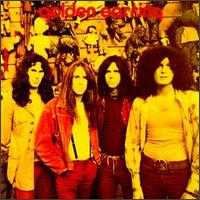FORMED: 1985
At a time when pop was dominated by dance music and pop metal, Guns N' Roses brought raw, ugly rock & roll crashing back into the charts. They were not nice boys; nice boys don't play rock & roll. They were ugly, misogynist, violent; they were also funny, vulnerable, and occasionally sensitive, as their breakthrough hit "Sweet Child O' Mine" showed. While Slash and Izzy Stradlin ferociously spit out dueling guitar riffs worthy of Aerosmith or the Stones, Axl Rose screeched out his tales of sex, drugs, and apathy in the big city; bassist Duff McKagan and drummer Steven Adler were a limber rhythm section that kept the music loose and powerful. Guns N' Roses' music was basic and gritty, with a solid hard, bluesy base; they were dark, sleazy, dirty, and honest -- everything that good hard rock and heavy metal should be.
Guns N' Roses released their first EP in in 1986, which led to a contract with Geffen; the following year, the band released their debut album, Appetite for Destruction. They started to build a following with their numerous live shows, but the album didn't start selling until almost a year later, when MTV started playing "Sweet Child o' Mine." Soon, the album shot to number one and Guns N' Roses became one of the biggest bands in the world. By the end of 1988, they released G N' R Lies, which paired four new, acoustic-based songs with their first EP.
Guns N' Roses began to work on the follow-up to Appetite at the end of 1990. In October of that year, the band fired Adler, claiming that his drug dependency caused him to play poorly; he was replaced by Matt Sorum from the Cult. During recording, the band added Dizzy Reed on keyboards. By the time the sessions were finished, the new album had become two new albums. After being delayed for nearly a year, the albums, Use Your Illusion I and II, were released in the fall of 1991. The Illusions showcased a more ambitious band; while there were still a fair number of full-throttle guitar rockers, there were stabs at Elton John-style balladry, acoustic blues, horn sections, female backup singers, ten-minute songs with several different sections, and a good number of introspective, soul-searching lyrics. In short, they were now making art; amazingly, they were successful at it.
While the albums sold very well initially, the band soon fell out of favor. Stradlin left the band by the end of 1991 and with his departure the band lost their best songwriter. Once Nirvana's Nevermind hit the top of the charts in early 1992, there was a distinct division between what was cool in hard rock and what wasn't; Guns N' Roses -- with all of their pretensions, impressionistic videos, models, and rock star excesses -- were very uncool. The band didn't fully grasp the change until 1993, when they released their album of punk songs, The Spaghetti Incident?; it received some good reviews, but the band failed to capture the reckless spirit of not only the original versions, but their own Appetite for Destruction. By the middle of 1994, there were rumors flying that the band was about to break up, since Rose wanted to pursue a new, more industrial direction and Slash wanted to stick with their blues-inflected hard rock.
